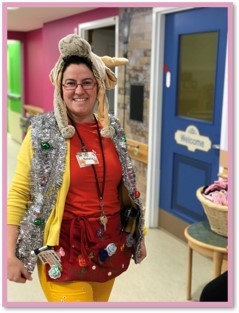Written by: Lindsay Marinovic, Person-centred & Emotion-focused Care Lead with Natalia Busch, RN, Team Leader, Seniors’ Services, Region of Waterloo
Natalia is a Registered Nurse (RN) and Team Leader for the Butterfly houses at Sunnyside Home, Region of Waterloo. Natalia, a native of Colombia, was interested in pursuing a career where she could help people. Natalia didn’t start off wanting to be a nurse, she started her journey in medical school before an experience changed her life.
During a student placement, Natalia cared for a patient who was dying of AIDS. “I watched him die a horrible death” explained Natalia. “I tried to tell them that he was in distress and no one listened.” Natalia felt that she didn’t have a voice. “Nobody cared, I hated nurses back then”. Natalia had to make a choice, run from the “business of healthcare”, or face it head on and work towards a better future. “I knew I could do better,” so Natalia left Colombia and travelled to Canada to pursue nursing.
Caring for older adults with dementia was natural for Natalia. Reflecting on her early days working as an RN at Sunnyside Home Natalia explains, “Whenever I was stressed out, I would go to the [dementia care] areas to get hugs and spend time with people.” When the opportunity presented itself to become the team leader for these areas, it felt like a perfect fit.
Natalia co-chairs the Palliative Care Committee at Sunnyside alongside the Chaplain. This interdisciplinary team has built a program that focuses on A Palliative Approach to Care. This approach focuses on comfort and quality of life by supporting an individual holistically and not just their clinical needs. It involves open and honest communication with families about what to expect when caring for someone with a chronic condition. People are supported as individuals to live their best life in the time they have left and to die a good death when the time comes.
Planning and communication is important in dementia care because it gives families time they need to prepare and to find moments of connection with the person they support. This doesn’t change what we do at the end of the life to keep people comfortable but it helps support a meaningful life along the way.
Natalia notes that A Palliative Approach to Care aligns with The Butterfly Approach by encouraging people to be more flexible. “It opens doors and helps people let go of control,” says Natalia. “They want a beer? Give them one! Ice cream? Why not? They want a hotdog? We’ll puree it or mince it [if that’s what they need].” By doing this “we feel like we’ve accomplished something, supported them until the end.”
Looking back, what advice would Natalia offer her younger self? “It’s never wrong to advocate… I was too shy back then, not wanting to stir the pot. Now I’m a little more assertive.” Natalia’s advocacy has an impact. “Families have been very thankful for the preparation and support that they receive and that we give them enough time to be there for those moments. It does make a difference.”

